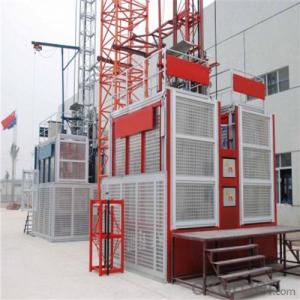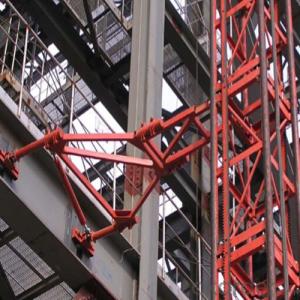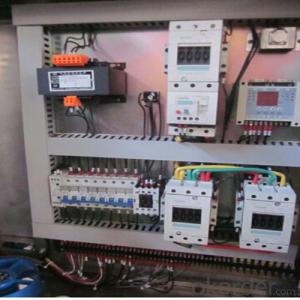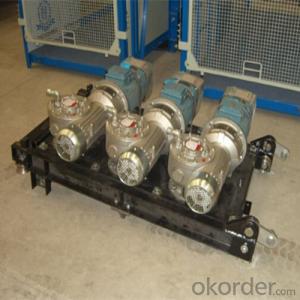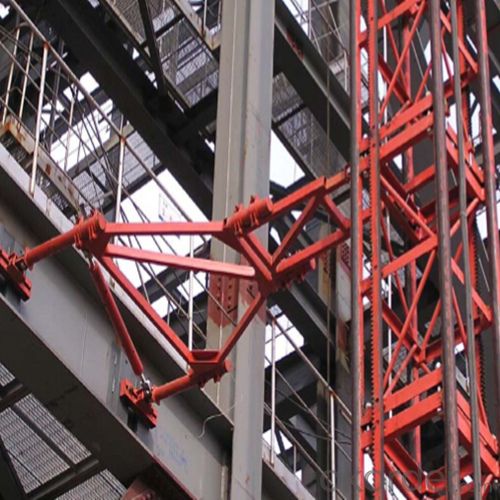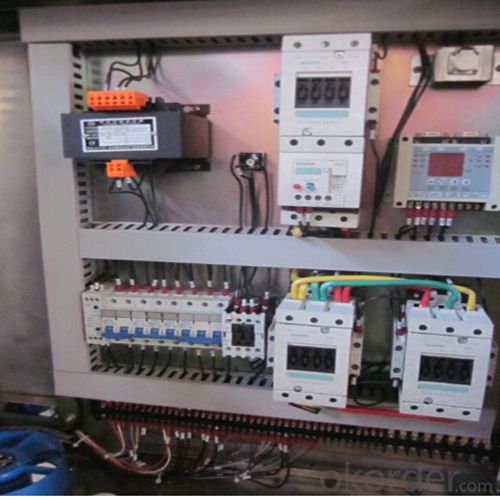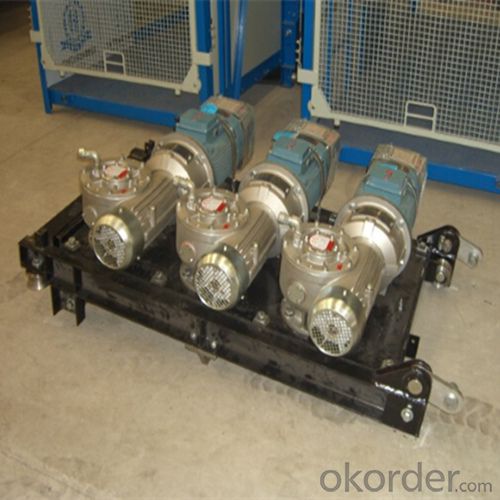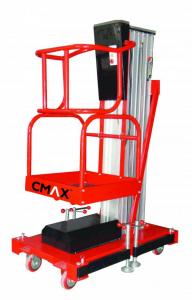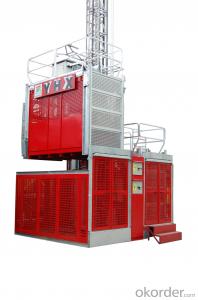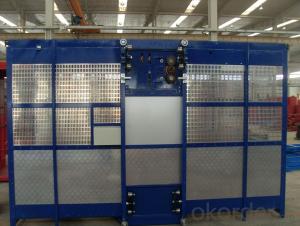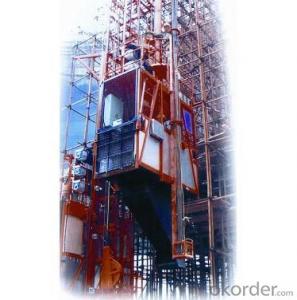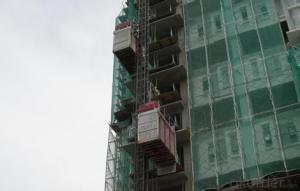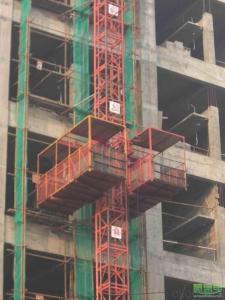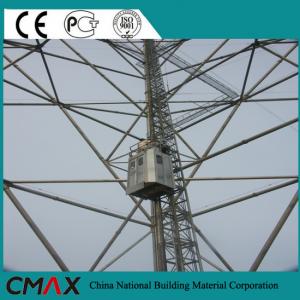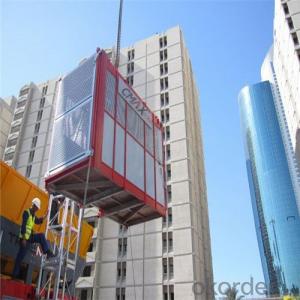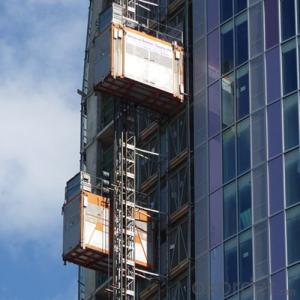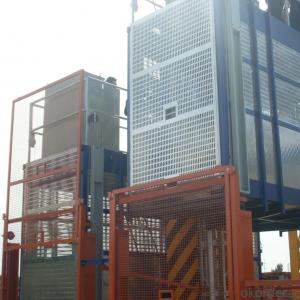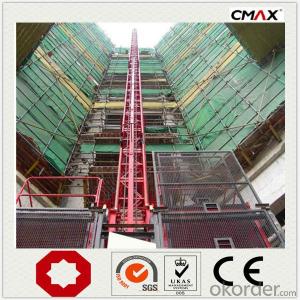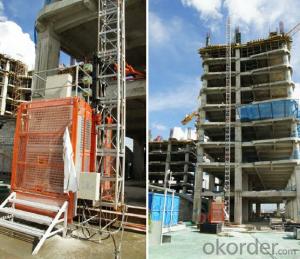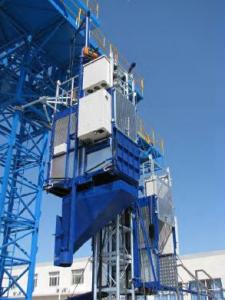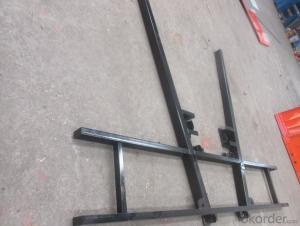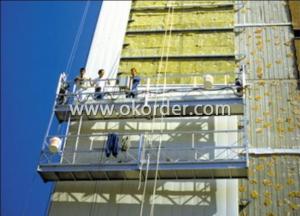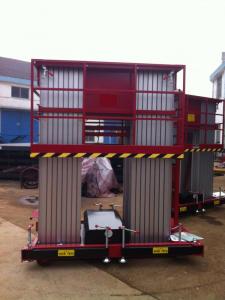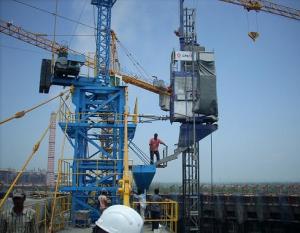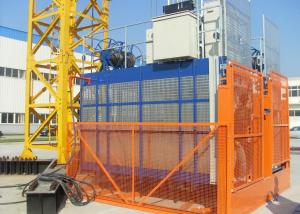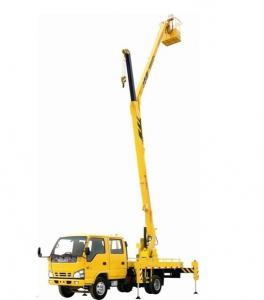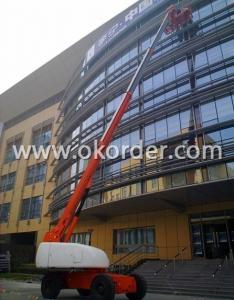Building Hoist SCD300/300 Lifting for Construction
- Loading Port:
- China main port
- Payment Terms:
- TT or LC
- Min Order Qty:
- 1 unit
- Supply Capability:
- 30 unit/month
OKorder Service Pledge
OKorder Financial Service
You Might Also Like
Structure of Building Hoist Description
Feature: Building Hoist Condition: New Application: Construction
Payload(kg):2*3000 Lifting Speed(m/min):0~60 Motor Power(kw): 2*3*15
Safety Device: 2*SAJ50-1.4 Cage: Twin Counterweight: Yes
Certification: CE,ISO Place of Origin: China(Mainland) Model Number: Type:SCD300/300
Packaging & Delivery of Building Hoist
Packaging Detail: Nude package Delivery Detail: 25-30days
Main Parts of Building Hoist
● Adopts the most advanced VF speed control device and microcomputer programmable logic controller.
● Stepless speed control helps eliminate the concussion during start up and braking, steady the operation process,
and ensures automated leveling.
● Adopts open loop V/Fcontrol; the speed control precision can reach ±2~3%. Realizes accurate low speed positioning of the hoist and avoid slipping during downward stopping of hoist.
● The VF system has current-restriction function, ensuring a small current when motor start up and reducing the concussion to power supply. It reduces the engery consumption and mitigates effects to on site electric equipments.
● The steadiness during running mitigates concussion to mechanical parts, reduces wears of rack, pinion and the brake
and prolongs the spare parts'life.
● The VF system also has the over voltage protection,low voltage protection, overcurrent, overload and anti-stalling protection functions,
● The system applies the special software for hoists developed by our company, making the operation more safe and
reliable.
Building Hoist Images
CMAX Building Hoist
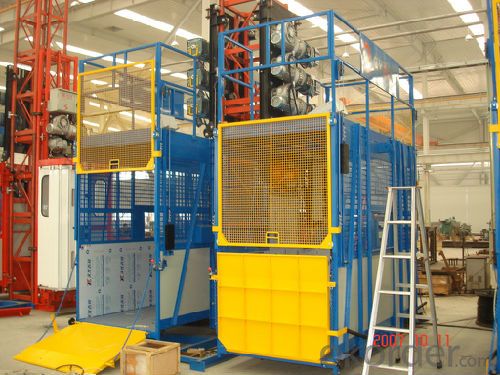
Anchorage System
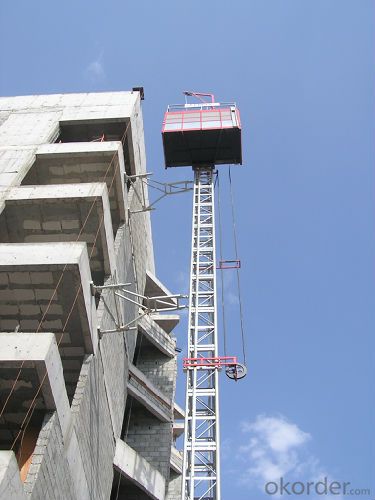
Mast Section
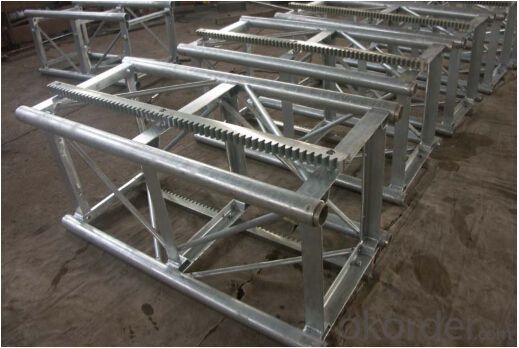
Building Hoist Specifiction
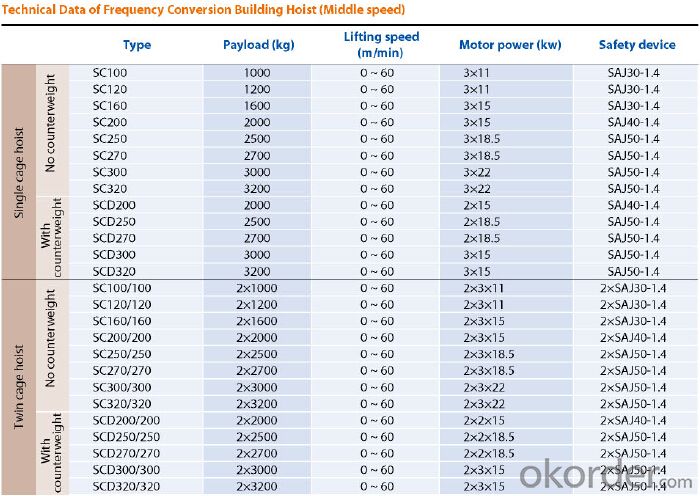
FAQ of Building Hoist
Q: What is the building hoist main purpose?
A: Building hoist equipped with double or single cabin to transport the materials and labors up and down. It's the ideal
construction equipment for vertical transportation in the field of construction.
Q: What is the main structure of building hoist?
A: The P/M construction hoist mainly contains metal structure, driving system, electrical control system, cable guide &
protection system, electrical top crane and safety device.
Q: What is the meaning of the building hoist’s code?
A: Take SC200/200 for example: “SC” stands for rack and pinion hoist, “200/200” stands for double cage and capacity
is 2 tons per cage. “SC200” stands for single cage and capacity is 2 tons.
- Q: The construction elevator can not operate during the use of several stages of wind power
- 11, when the wind speed exceeds 20m/s and the bad weather, such as hail, not use the lift." I'm a construction elevator This is the norm It's about a six-stage wind by 20m/s.
- Q: This question asks for measures to protect lifting equipment from damage during its operation.
- <p>To prevent damage to lifting equipment during operation, ensure regular maintenance and inspection are conducted to check for wear and tear. Adhere to the equipment's load limits and never exceed them. Use appropriate lifting techniques and ensure the load is balanced. Keep the equipment clean and free from debris. Train operators thoroughly on safe operating procedures. Avoid sudden starts or stops, and ensure all safety features and guards are in place and functioning correctly. Regularly check cables, hooks, and other critical components for any signs of damage. Always follow the manufacturer's guidelines and industry safety standards.</p>
- Q: Is there a specification requirement for the floor door of the elevator to the floor? How high
- The door locks must be in the direction of the elevator, and the people on the floor are not allowed to move at will, only the driver will be able to move. The other is that the height of the door must be 1.8 meters high, so that the workers' heads don't reach out to the danger.
- Q: What are the pros and cons of utilizing hydraulic fluid within the system of a building hoist?
- <p>The advantages of using hydraulic fluid in a building hoist include smooth and controlled lifting, which reduces the risk of accidents. It also offers a compact design due to the high power-to-weight ratio of hydraulic systems. Additionally, hydraulic systems are known for their durability and low maintenance requirements. However, there are disadvantages such as the potential for leaks, which can be hazardous and costly to repair. The systems can also be sensitive to temperature changes, which might affect performance. Lastly, hydraulic fluids can be environmentally harmful if not properly managed, posing disposal challenges.</p>
- Q: Is it possible for a single lifting device to simultaneously lift multiple objects with varying weights?
- <p>Yes, a single lifting device can be used to lift multiple objects at once with different weights, provided the total weight does not exceed the device's lifting capacity. The device must be designed to handle the combined weight and ensure even distribution of the load. Safety measures and proper securing of the objects are crucial to prevent accidents. It's important to follow the manufacturer's guidelines and never exceed the maximum load capacity to avoid damage or injury.</p>
- Q: This question asks for guidelines on the safe operation of a building hoist, a device used to lift materials in construction.
- <p>To use a building hoist safely, follow these guidelines: Ensure the hoist is properly installed and inspected by a qualified person. Never exceed the hoist's weight limit. Keep the hoist area clear of obstacles and ensure all safety devices are functioning. Do not use the hoist if there are any visible defects or damage. Always secure the load properly and ensure it is balanced. Never leave the hoist unattended while in operation. Use hand signals or a communication system to coordinate with the operator. Regularly inspect and maintain the hoist to prevent accidents. Always follow the manufacturer's instructions and adhere to local safety regulations.</p>
- Q: This question asks for a comparison of vertical and horizontal lifting in the context of building hoists, highlighting their distinct characteristics.
- <p>Vertical lifting in a building hoist refers to the movement of materials directly up or down, which is essential for transporting goods between different floors or levels of a building under construction. Horizontal lifting, on the other hand, involves moving materials across a horizontal plane, which is useful for moving items along a floor or between different parts of a construction site. Vertical lifting is typically more common in hoists due to the nature of building construction, requiring frequent vertical transport. Horizontal lifting is less common but can be implemented with specialized equipment or by combining vertical and horizontal movements. The choice between vertical and horizontal lifting depends on the specific requirements of the construction project and the layout of the site.</p>
- Q: Is it possible to substitute a hydraulic cylinder for an electric motor in a building hoist system?
- <p>A hydraulic cylinder can indeed be used as a replacement for a motor in a building hoist, but it requires a different system design. Hydraulic systems use fluid pressure to generate linear motion, which can be harnessed to lift and lower loads. They offer high power-to-weight ratios and can handle heavy loads, making them suitable for hoisting applications. However, they require a power source for the hydraulic pump, and the system must be designed to manage fluid flow, pressure, and safety features. Unlike electric motors, hydraulic systems also need regular maintenance and can be less energy-efficient. Despite these differences, with proper design and engineering, a hydraulic cylinder can effectively replace an electric motor in a hoist system.</p>
- Q: The elevator is banned from using elevators for more than a class of high winds
- According to the safety requirement is level 6, please adopt!
- Q: What is the meaning of double straps in the construction elevator?
- With double cage for heavy, namely SCD200/200 series Is the two cages, each cage has a corresponding weight, the weight up and down in the elevator cage rise to energy conservation and reduce the reaction between the up and down, when you imagine front-rear door principle is about the same
Send your message to us
Building Hoist SCD300/300 Lifting for Construction
- Loading Port:
- China main port
- Payment Terms:
- TT or LC
- Min Order Qty:
- 1 unit
- Supply Capability:
- 30 unit/month
OKorder Service Pledge
OKorder Financial Service
Similar products
Hot products
Hot Searches
Related keywords
